Table of content:
1. Why we dislike YouTube
2. How we actually can replace YouTube
3. How we in general can rebuild Consumer Internet & Society
Did you know that the YouTube Rewind 2018 is the most disliked YouTube video ever? Haha, I love the irony.
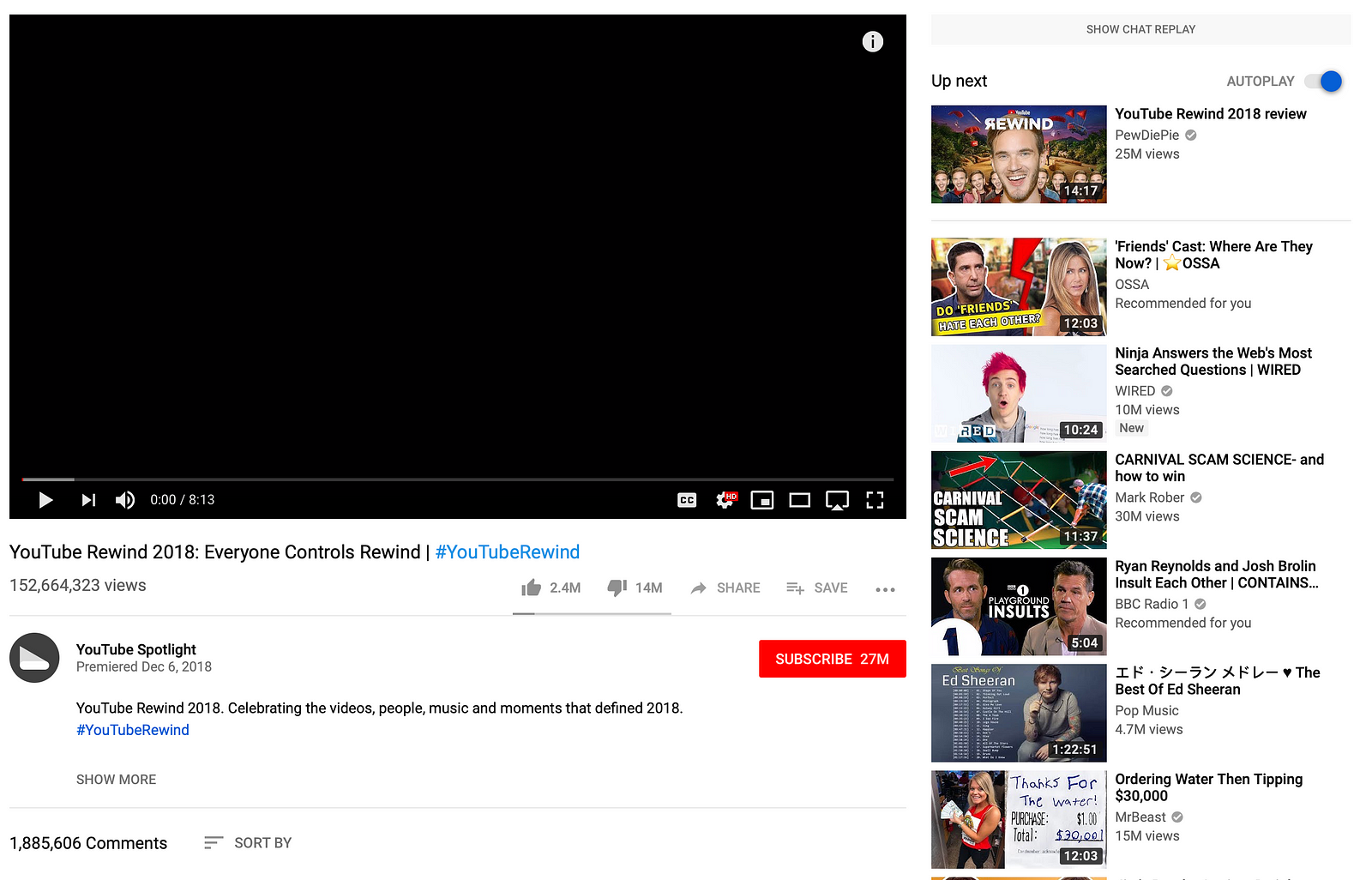
The backlash against big-tech companies (YT, FB, Amazon, Google etc) is real. But we rarely talk about how to replace these big companies, to create better Internet services that makes people happier.
Damaging reputation is one thing, and YouTube’s surely is damaged after comments like these below.
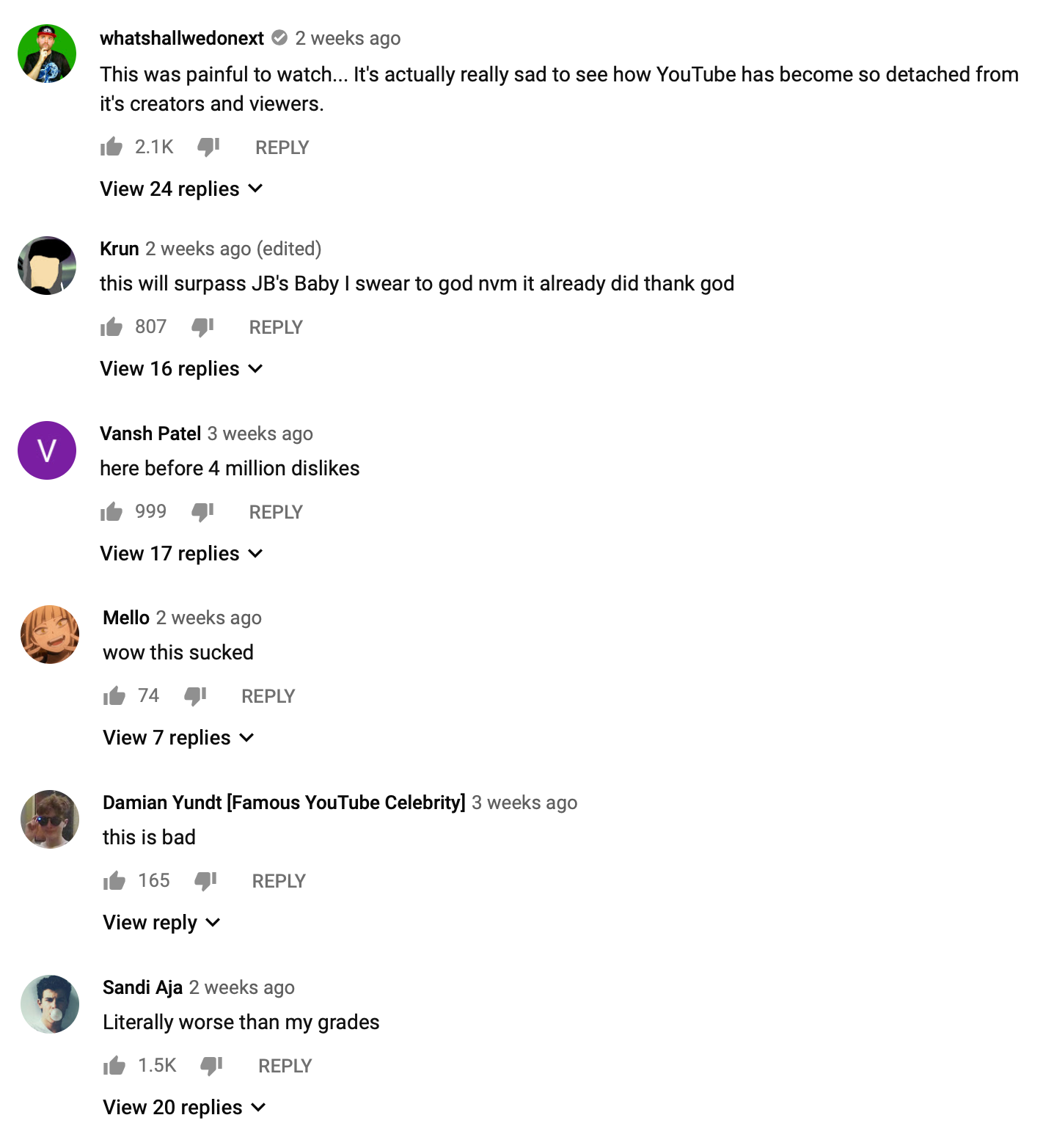
To compare with a rewind from an actual content creator..
Whilst YouTube’s own Rewind is the most disliked video ever (14% likes) — the most famous content creator PewDiePie made his own rewindwhich instead became the most up-liked video ever (99.3% likes). Don’t watch his rewind here, instead focus your attention, and finish this article 😉
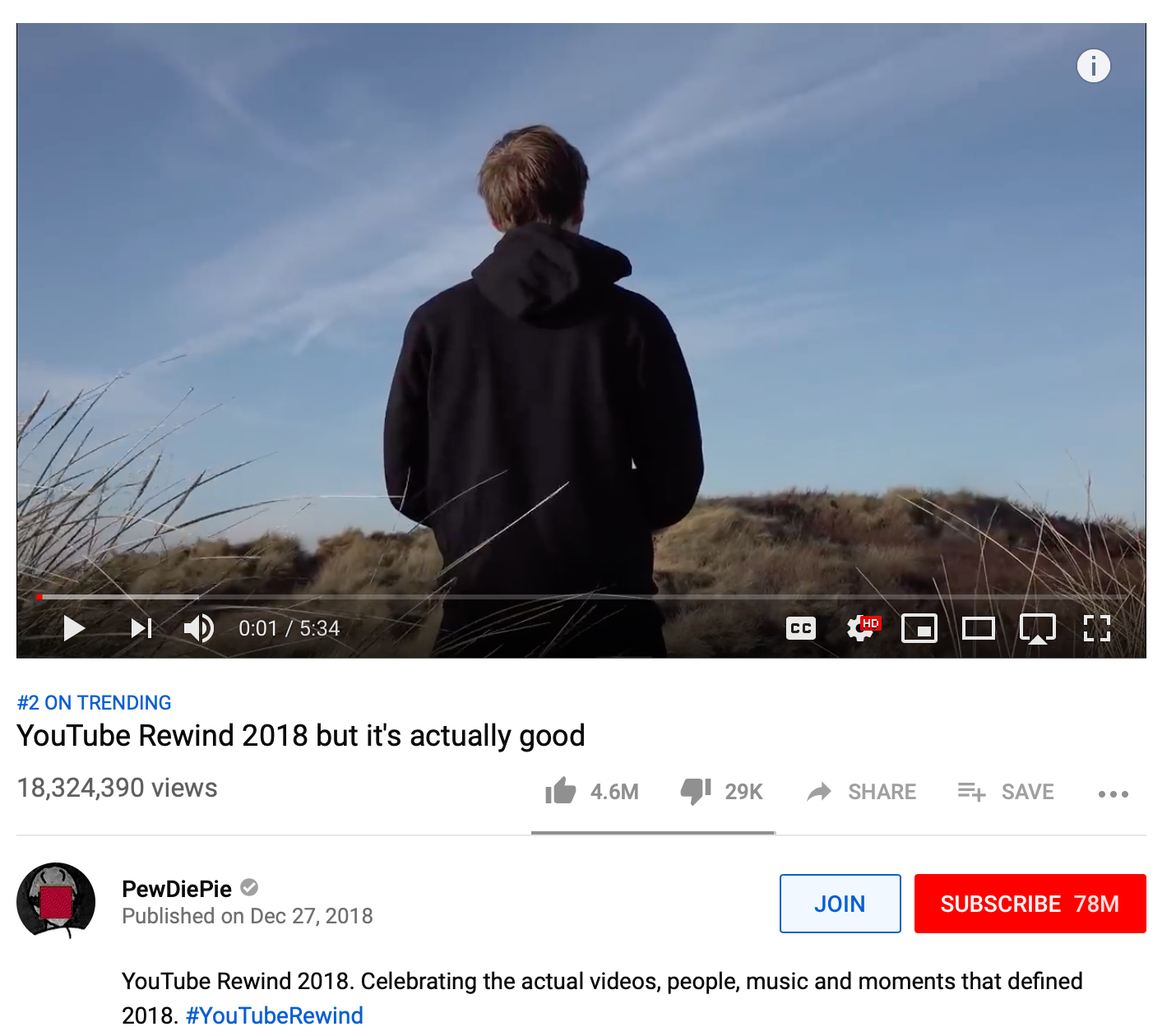
Different motives for YouTube & content creators
Yesterday after catching up on what I been missing the last few years from PewDiePie, I got curious in what motivates him now that he’s financially independent. It seems his motivation is to actually uplift people, and I’m certain lots of people around the world are entertained by his humor.
YouTube on the other hand, are much more interested in the bottom-line, the net-profit it can distribute to its shareholders. Creating persuasive technology that hooks viewers so they can be shown more and more advertising. Making people happy isn’t necessarily YouTube’s mission, whilst it is for content creators like PewDiePie.
There’s a saying “PewDiePie don’t need YouTube. YouTube need PewDiePie.”
So what if we could give content creators & users a better platform? One that doesn’t seek to make it’s users addicted, allow users to educate themselves through interactive videos, and offer general next-generation user experience.
The tech backlash against YouTube is following the broader tech backlash
Cambridge Analyticascandal, Trump election, Patreon censorship. Persuasive technology (Facebook, YouTube) builds on making people addicted, not making them long-term happy.
Take the example of heavily critiqued Facebook. We trust Facebook with our data (posts, photos, contacts, private messages but also interests, psychological patterns) and in return we get: free services & targeted advertising. What if I could just pay $1 a month for them to host my data? Well, its possible. But that’s not going to help Facebook grow revenue, so they won’t give that option to me. Instead, they will use my data against me, so I become addicted, see their advertising and increase my life-time-valueas a user.
Time pressure (in fear of winner-takes-all-effectand shareholder dividends) forces these companies to become “evil”. Venture capital is what allow these companies to blitz-scale, and gain the power necessary to win the battle against competitors. And this likely won’t change. Fighting against capitalism is likely to be a dead end. But what if the battle-ground changed? What if consumers were given a choice, rather than being seen as landmass being fought for? What if we brought power to the people? Made Internet democratic rather than ruled by a few corporations? Perhaps that is the real reason democracy is under scrutiny, because Internet isn’t democratic as it set out to be, but rather governed by venture capitalists (no pun intended) and their fear of missing out.
The reputation of these companies are hurt, but it doesn’t really affect them
What’s our option to big tech? Post a negative comment on YouTube Rewind? Where will I go to consume my next video, obviously from the YouTube recommendations in the sidebar.
#DeleteFacebook. Okay how do I now keep in contact with rarely-talked-to friends? Amazon paying low wages? Ok, keeps down my prices. Huawei spying for the Communist Party of China? Still, they got the best smartphone camera on the market…
There’s both hypocrisy & laziness (shooting ourselves in the foot long-term) but also a lack of choice.
There are alternatives but they’re not worth the hassle
For YouTube, you can increase your privacy
DuckDuckGo offer’s a way to view YouTube videos without being tracked. But the price you have to pay is too big, there is no navigation except for entering new search terms, which is why nobody (except for Edward Snowden) use it.
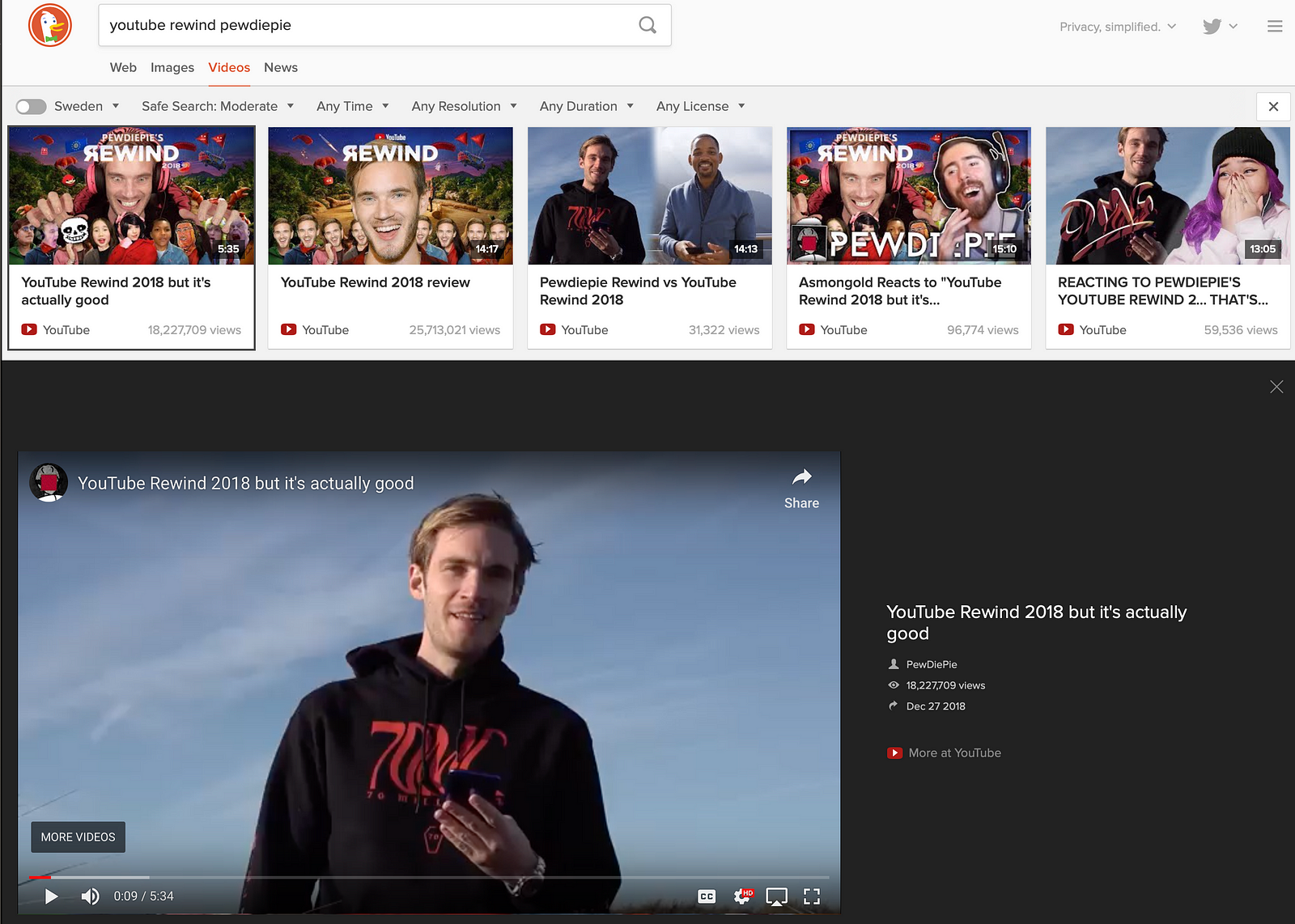
You also have “fair-algorithm” versions to Google Shopping, tons of social media & content alternatives fueled by Cr$ypt0-incentives (Eureka! or {not}) competing with FB, YT, Medium, Twitter etc but none of these are really good, and worth giving up our old habits for. So I won’t mention any.
In order to compete with these billion-dollar companies:
We need great consumer products, built by the community — for the community
The products we build can’t lack critical elements. They need good governance. And they need to win the competition against YouTube, Facebook, Google and whatelse not (by being 10x better, or other unfair advantage). And they need to built ASAP.
YouTube is a low hanging fruit to replace, but it’s not the only one
Another low-hanging fruitis Google Shopping. Imagine a search-engine that finds you sustainable products (socially, ecologically, politically (no Chinese)), give you purchase insights when you need it (buying guides & reviews relevant to the product choices) and got features such as personalized search based on all your e-commerce purchase & browsing history (imported from browser & e-mail). Basically, it ranks the best products on top, not the one that pays most (like Google Shopping) and give you insights into what to think of when making a purchase. In eseence, you can vote with your wallet.
Likewise, how do you consume news? My findings is that there’s no way, on the whole Internet, to read news once a week. If I want to know about key events, I have to check-in daily, because the algorithms of the feeds wants my attention.
How about Facebook, Instagram, Twitter, Snapchat? Do you like to log in at the accounts you have there daily to check notifications? One possible way of replacing these is by having one social media feed that aggregates all your content, and allows you to post to them all seamlessly. This is available for business, but not consumers. More on this later.
So let’s start with YouTube.
YouTube is the 2nd most visited page on the Internet
And the engagement metrics are crazy. 21 minutes average visit?
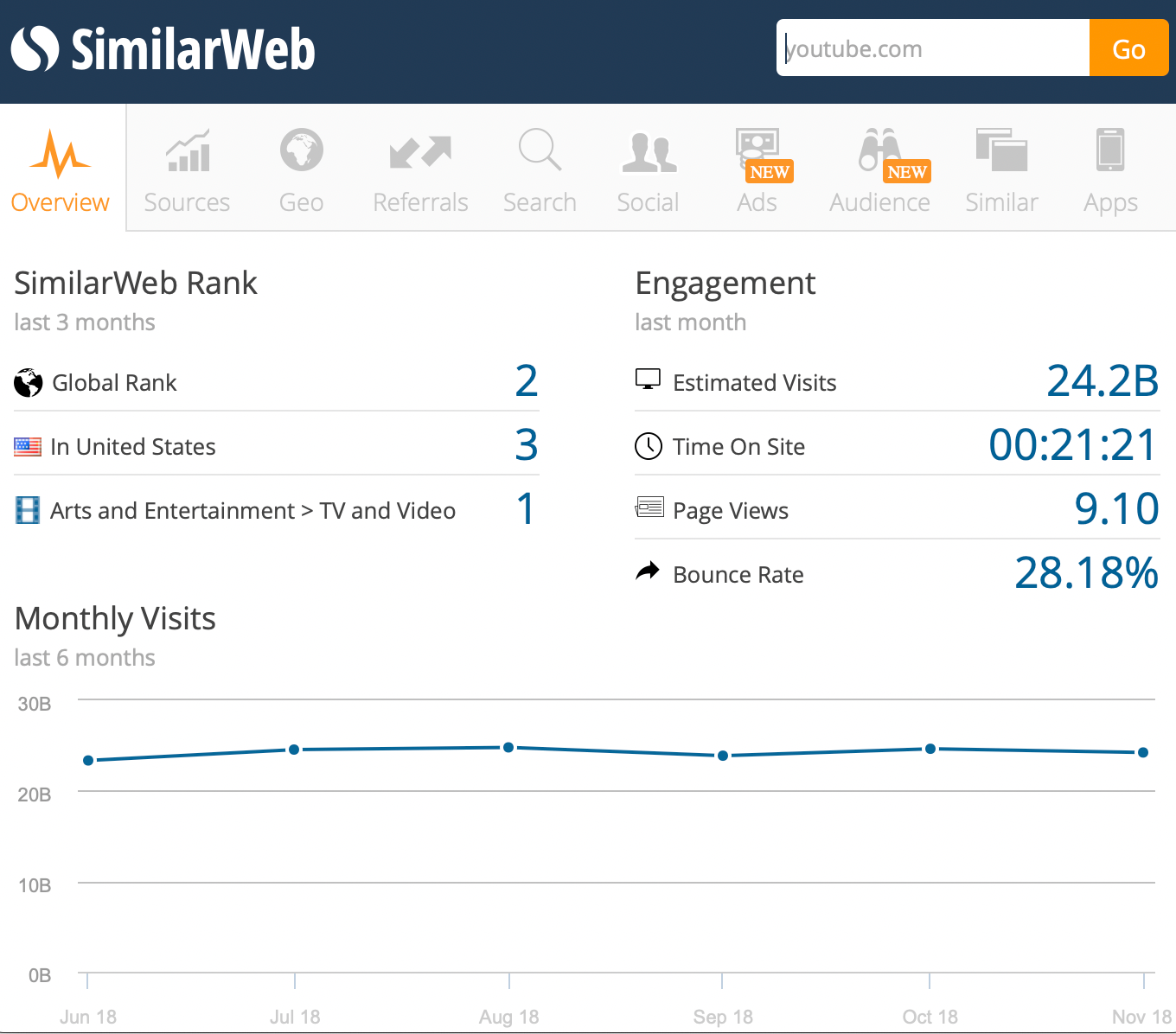
But there are no real competitors
Sure you have Vimeo and DailyMotion. But their numbers added together make up about 1.5% of YouTube’s traffic and 0.3% of time-on-site.
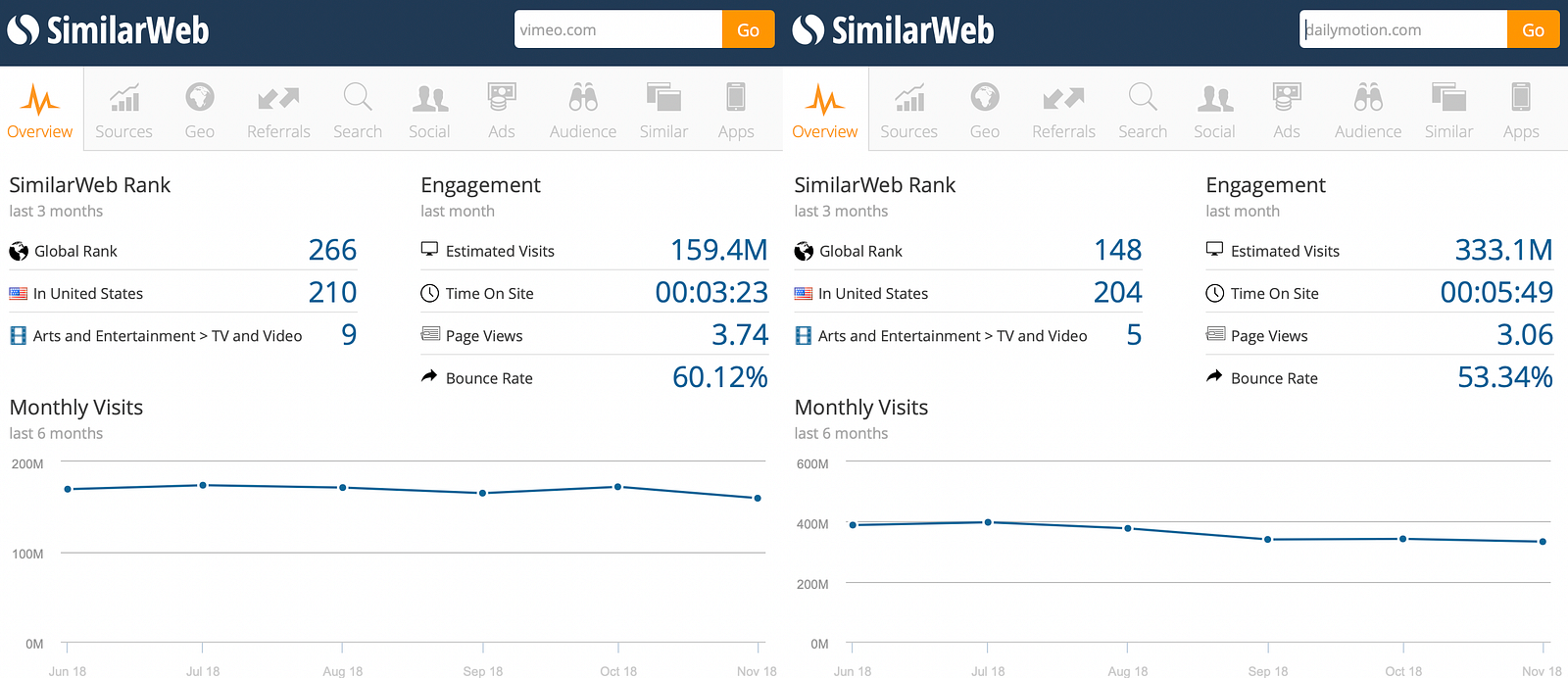
So why is it that YouTube has a near-monopoly on online videos?
One might say, network-effect. But that would miss a lot of aspects.
You see, YouTube content is freely available, they have an API so third party apps can request & interact with YouTube content. So network-effect doesn’t really apply (unless YouTube play ugly, and lock-out competitors (doing business with Chinese characteristics).
In my opinion, its just that no one gave an honest try at competing with them.
How to replace YouTube
Once there is a video platform that is 10x better, then large content-creators (like PewDiePie) can promote to their following to leave to the new platform and a revolution can start where all users transfer to the new platform — and soon only the uninformed will be left at YouTube.
So how do we build a platform that is 10x better? Let’s figure it out together, and then build it together.
If there’s anything you can help with, it is to please share this article on social media in order to get the movement going. Perhaps a friend of your friend on Facebook, Reddit or Twitter is a developer who can join on this journey. So please, if you’ve already read this far, and believe in the vision we have, share this so that we can rebuild society bottom-up.
My ideas on how to replace YouTube
In short, imagine a client TAVP (The Awesome Video Platform)where you have all features of YouTube (all videos, you can comment/like (and dislike YouTube rewind), create playlists, message other creators (both YouTube creators and platform-native), and sync your YouTube inbox with the one you have for TAVP.
Okay, so you have all features that you currently have on YouTube. (To be frank, this should work from a legal standpoint even tho it seems ludicrous. For details, look further on 3rd-party-clients section below)
Now,
On top of that you can browse YouTube like normal, you also have Amazing features such as Interactive videos, Topic Filters, Integrated donations, Integrated Premium Videos (Online Courses), Censorship-sensible, Non-addictive recommendations and Privacy.
Interactive/Explanatory videos
Imagine you didn’t fully understand all the concepts I’ve referred to in this article, such as Winner-takes-all-effect, blitz-scaleand network-effect.
Questions like “Do you know concept X” with answers “Yes, skip explanation” or “No, please explain” allows content-creators to create videos about topics that interest them, without worrying about their audience’s knowledge about the topic (which is a very common issue for YouTube creators, as most have to limit themselves to a very specific niche).
This UX functionality stretches further than just explaining topics. It can also allow the creator to move away from daily, or weekly uploads — and instead focus on deeper, higher quality pieces — with different angles dependent on the interest or knowledge of the viewer.
Payment solution
If YouTube were forward-thinking, Udemy wouldn’t exist. With now 100 million monthly visits, Udemy dominate online video-courses. Most online teachers use YouTube only as a way to gain traffic, whilst they sell their courses on a 3rd party platform. With the fact that Udemy don’t got an exclusivity license, online teachers can also offer to sell their courses on TAVP, which would make them link from their YouTube channel to TAVP rather than to Udemy.
Support integrated to the platform (Patreon-like)
Instead of content-creators sending out their subscribers to external platforms like Patreon to give donations, that process can take place right on the video platform.
Topic-navigation on top of keywords
YouTube is in nature extremely keyword-driven. I don’t know if you ever been frustrated by this, but I certainly have. When you search for, say “rap music”, you get these compilations of rap music, you don’t really get a list of rappers to choose from. Imagine rather you’d get that list, and that you could choose your five favorite artists and then you’d be played a mix from those five.
Or, say you search for “learning guitar” on YouTube. What if there was a couple filters for you to easily find the best video for you:
Type of guitar: Acoustic/ Electric
Do you already know some chords: Yes/ No
What genre: Jazz, Rock, Country, More
What do you want to learn: Chord/ Song/ Technique
Privacy whether you want addictive videos or not
If you wish that the data you generate (what you watch & like on YouTube) won’t be you used against you to make you more addicted — you should have the right to say no. You should have right to tweak the algorithm to instead show you more educative than entertaining videos.
Shared ad-revenue
The most obvious benefit for content-creators is that the ad-revenue can be shared more equally. This means content creators would receive higher percentage of the ads paid (YouTube currently takes 45% commission). (unfortunately being ad-free isn’t optimal, since advertising-driven business models democratizes content)
Censorship-sensible, governed collectively rather than by power
With the PewDiePie jokes offending advertisers, the de-platforming of YouTube, the Patreon censorship boycottetc — we are seeing a big problem with censorship initiated by payment providers, advertisers or nation states.
Governing content online is a complex issue, and one this article won’t dive deeper into, but in essence, new methods of governing are emerging (read DAO). Videos like “how to build an atom bomb” should clearly be censored.
Browsing YouTube privacy-friendly
Of course, you should be able to browse YouTube through this 3rd party platform privately, with no browsing data shared to YouTube (like DuckDuckGo).
News aggregator
A section that links online videos with relevant news-events. But more importantly, allow news-browsing features of the 2020s, where the battle for attention is tough, information needs to trustful & highly relevant and audio & video will continue to play a larger role.
With above functionality we can create a much more prosperous video platform
It’s not really hard. A couple engineers, DevOps, UX and a legal team and we’re ready. What’s currently difficult is making these few individuals collaborate together towards building a new YouTube, a new news-aggregator, a new price-comparison website or whatever else product it may be.
That’s why one of the core pillar-stones of our mission to improve society (replacing/improving consumer apps & creating a bottom-up, expressive democracy) is to facilitate an easy way to collaborate towards common good.
Large-scale collaboration is what makes YouTube fail
In an innovative, future-looking setting, YouTube would of offered most of the functionality mentioned above. They wouldn’t of messed up with YouTube Rewind, featuring artists who aren’t even YouTubers.
As with the example of YouTube Rewind, it shows how far away from the content, the memes, the trends the community managersof YouTube are. In their own platform, with all data available to them, they entirely missed the whole conversation. And they put a non-youtuber in the introduction, like come on. The problem is of course, the incentives of YouTube management isn’t aligned. There’s too little skin-in-the-game, and too little purpose.
Partly because the organization has grown too big and too old, but more so because their lack of large-scale collaboration, to retrieve ideas from all angles, focusing on what’s important, building wise incentive-strucutres and executing efficiently.
Doing the above is likely harder than it looks like, which is why we need to get community working towards this as big as possible, so please share this article.
Our mission is to re-build society, starting with Consumer Internet
First step is through better large-scale collaboration
During the following weeks I will publish more thoughts on a next-generation content aggregator, how to facilitate large-scale collaboration and sharing my thoughts on a future worth striving for. Follow, clap and share this article for changing the world to the better, on Mediumor Twitter.
To not understate the obvious, please, you, share this article on social media so we can grow a larger audience.

You may say I am a dreamer, but I’m not the only one.
Yours truly,
Erik Allberg
A deeper look at 3rd party clients
Starting with Reddit, we have various 3rd party clients such as Reddup, Sync for reddit, Boost for reddit, Reddit is fun, Joey for Reddit, BaconReader and much else. None of them got more than lower millions of users, but the content offered by 3rd party app readers are more or less the same as browsing normal Reddit. You can even sign in to Reddit via the 3rd party app.
For Youtube, we have “Client for YouTube”, NewPipe, VideoTube, MyTube etc.
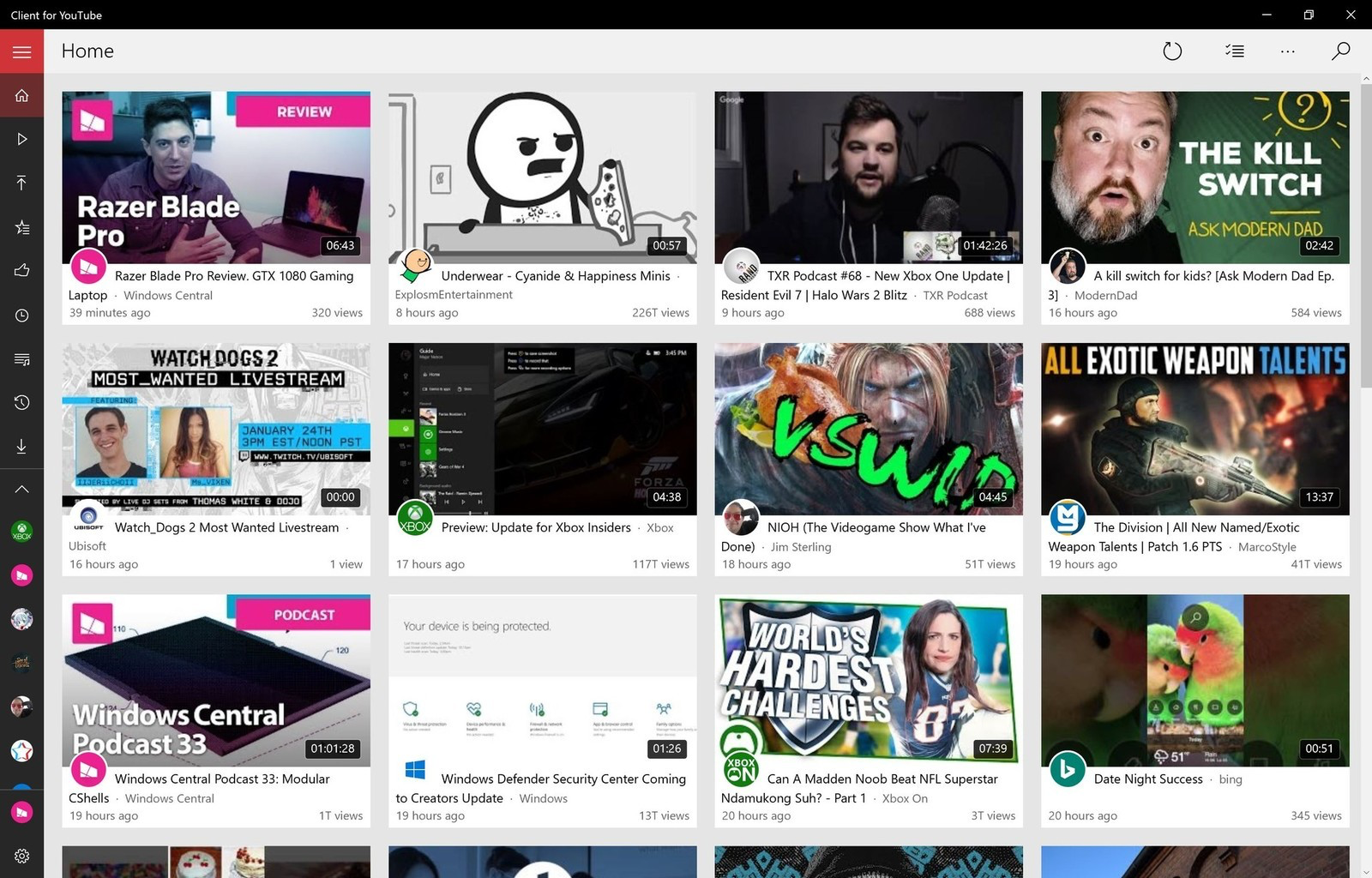
These also allow you to log in to your YouTube account and comment/like on videos, manage your inbox etc.
It’s possible through the API of YouTube.
Now, the risky part is that YouTube manages this API. Would YouTube ban an application as explained above from that API? How would the community react to that? Worse than the YouTube Rewind? Still, it would be an efficient solution.
If they did ban it, like Chinese WeChat banned Uber(ugly method), would it be illegal in our nation states to “scrape” YouTube user-generated content?
What’s actually holding us back from offering consumers a choice to the big, mighty giant YouTube?
Up to a legal team to dig into.
Legal disclaimer: This article is for entertainment and educating purposes only. Nothing in the article should be seen as business plan, intent or activity. Made by Senses AB and not by Erik Allberg personally.